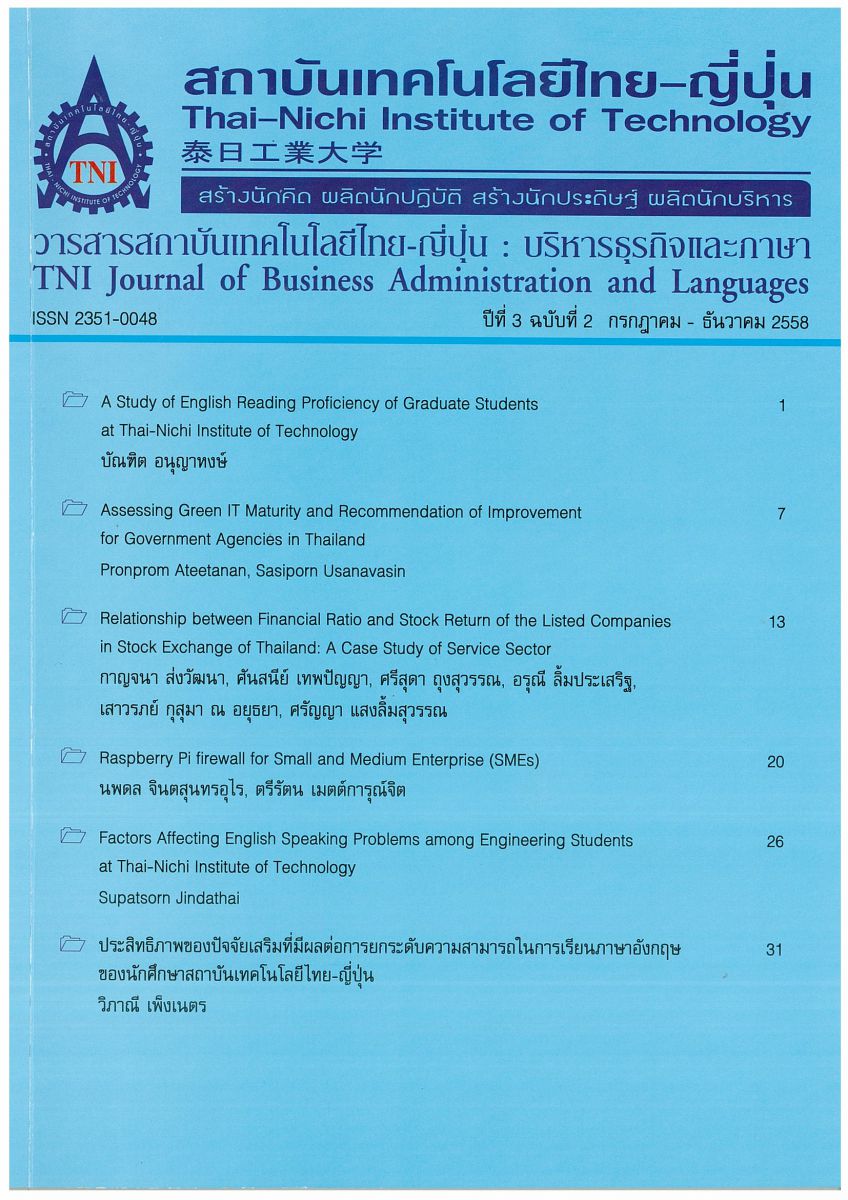Assessing Green IT Maturity and Recommendation of Improvement for Government Agencies in Thailand
Main Article Content
Abstract
Role of Information Technology (IT) in responsible for environmental and sustainability matters has been approaching to IT & Non-IT Executives, policy makers, practitioners and business consultant’s interests. Green IT is one of the keys to becoming a green low-carbon society. This study presents a model for assessing the level of Thailand Green IT Maturity. The study applies Korea National Information Society Agencies (NIA) Green IT Maturity Model Integration (GMMI) to assess the readiness of Green IT in Thailand government sector. This study uses this model to evaluate 55 government agencies from ministerial and departmental or equivalent level to assess the overall level of Green IT maturity among government agencies. The current status of Thailand Green IT Development in government agencies and improvement strategies are presented in this study. The overall levels of Green IT maturity among Thailand government agencies are likely to be lower. The needs for Green IT are acknowledged. Limited Green IT efforts are found but not producing substantial outcome. Structure and framework on Green IT are required for systemic management. Green IT efforts are required by adopting a variety of technology to manage eco-friendly IT resources. In order to accelerate Green IT development in Thailand, this study recommends that the government should take a leading role to promote Green IT through National Green IT initiatives including the reform of policy, strategy, regulation and promote education & training as well as provide technical assistance for accelerating Green IT development. Future study should be expand the assessing agency to national level including local government and/or private sector for further development and towards to low carbon society.
Article Details
Article Accepting Policy
The editorial board of Thai-Nichi Institute of Technology is pleased to receive articles from lecturers and experts in the fields of business administration, languages, engineering and technology written in Thai or English. The academic work submitted for publication must not be published in any other publication before and must not be under consideration of other journal submissions. Therefore, those interested in participating in the dissemination of work and knowledge can submit their article to the editorial board for further submission to the screening committee to consider publishing in the journal. The articles that can be published include solely research articles. Interested persons can prepare their articles by reviewing recommendations for article authors.
Copyright infringement is solely the responsibility of the author(s) of the article. Articles that have been published must be screened and reviewed for quality from qualified experts approved by the editorial board.
The text that appears within each article published in this research journal is a personal opinion of each author, nothing related to Thai-Nichi Institute of Technology, and other faculty members in the institution in any way. Responsibilities and accuracy for the content of each article are owned by each author. If there is any mistake, each author will be responsible for his/her own article(s).
The editorial board reserves the right not to bring any content, views or comments of articles in the Journal of Thai-Nichi Institute of Technology to publish before receiving permission from the authorized author(s) in writing. The published work is the copyright of the Journal of Thai-Nichi Institute of Technology.
References
M. B. Geoffrey N Dick, "Green IT in Small Businesses: An Exploratory Study," in the Southern Association for Information Systems Conference, Atlanta, GA, USA., 2011.
V. A. C. Alemayehu Molla, Siddhi Pittayachawan, "IT and Eco-Sustainability: Developing and Validating a Green IT Readiness Model," presented at the Thirtieth International Conference on Information Systems, Phoenix, 2009.
J. E. Sang-Hyun Park, Joosung J. Lee, "Assessing and Managing an Organization's Green IT Maturity," MIS Quarterly Executive, p. 14, 2012.
T. Ministry of Information and Communication Technology. (2011). Thailand National ICT Policy Framework 2011-2020. Available: https://cloudfile.mict.go.th/public.php?service=files&t=a87a2f145
fdc6d1e5787eb8&download
R. D. Hersch, & Bonecutter, C.R. , "The business case for a greener IT Agenda: Accenture Outlook 2008," The journal of high-performance business, 2008.
C. o. o. U. K., "Greening government ICT: Efficient, sustainable, responsible," 2008.
M. Alemayehu, "The Extent of Green IT Adoption and its Driving and Inhibiting factors: An Exploratory Study.," Journal of Information Science and Technology, p. 21, 2009.
V. H. B. Mitesh Desai, "Green IT Maturity Model: How does your Organization Stack up?," Infosys Technologies Limited2011.
NSTDA. (2011). APECTEL: Study Workshop on Best Practices Transfer of Green ICT for Sustainable Growth.
T. Ministry of Information and Communication Technology. (2014). (Draft) the third Thailand National ICT Master Plan (2014-2018). Available: https://cloudfile.mict.go.th/public.php?service=files&t=40881ff3e1902055177a3dbf49c5192e&download


